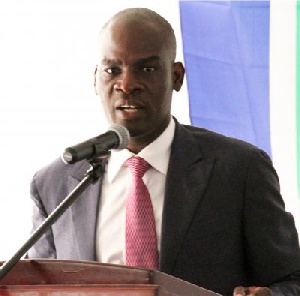The Ministry of Trade and Industry is revising some provisions of the Ghana Standard Authority and a new bill will soon be submitted to parliament and cabinet for consideration.
Mr Haruna Iddrisu Minister of Trade and Industry said when the bill is passed it would help strengthen and improve standards of the Ghana Standard Authority and its working relationship with the Food and Drugs Authority Mr Iddrisu was addressing a National Forum on “Technical Regulations and Standards” in Accra, this he said had the potential of establishing a world class national quality infrastructure and technical regulation framework in Ghana.
He said the European Union and Germany had supported Ghana in attaining standard and quality infrastructure in trade capacity building and government was determined to expand Ghana’s exports from the current 2.3billion US dollars to 5 billion dollars by 2017.
The Sector Minister noted that the Ghana Standard Authority and the Food and Drugs Authority of the Ministry of Food and Agriculture had been supported to improve quality standards and it was time to diversify the selection of countries for the exportation of Ghana’s products.
He said as part government’s trade and investment promotion policy, new markets had been identified and trade offices opened in Turkey, China, Japan and South Africa. Mr Iddrisu announced that the Ministry was collaborating with the European Union sponsored Trade Related Assistance and Quality Enabling (TRAQUE) programme to revise the national quality policy, which was developed in 2008 but never approved.
He explained that for the meantime, the Economic Community of West Africa States (ECOWAS) Quality Policy and the Quality Infrastructure Documents which were prepared under the West African Quality Programme had become reference documents for member states.
Mr Micheal Senayah, TRAQUE project Director said following the decision of the government and the European Commission to implement TRAQUE, a financial agreement had been signed on January 13, 2011, which foresaw a total budget allocation of 9 million Euros support.
The amount would be implemented through a combination of service contracts, grants agreements and successive programme estimates. Mr Senayah said the TRAQUE programme as aimed at offering continued support to the Ministry of Trade and Industry in private sector development, trade facilitation and capacity building with special attention to capacity issues.
The programme would also take care of industrial strategy and post Economic Partnership Agreement implementation support, as well as the standards, national quality institutions and trade and private sector export support organisations.
Mr Senayah said the TRAQUE programme would be implemented through a number of programme estimate for which a budget of 1 million euros had been allocated. He said an additional budget of 0.7 million Euros had been provided as grants to Ghana Export Promotion, National Board for Small Scale Business and Industries, the Ghana Standard Authority and the Food and Drugs Authority.
The TRAQUE project Director said a specific budget line of 100,000 Euros had been indicated within the financing agreement to assure the visibility of the TRAQUE programme and to assure the communication among the beneficiary institutions and the major stakeholders.
One of the main components of the TRAQIUE Financing Agreement, he noted was to provide laboratory equipment to National Quality Infrastructure Institutions with a budget allocation of 5 million euro.
This activity, he explained required specific technical assistance with the development of short term experts on laboratory equipment and quality processes under the responsibility of the long term expert on quality.
The Food and Drugs Authority and Veterinary Services Department of the Ministry of Food and Agriculture laboratories among others would benefit from the equipment to help improve their operations.
Experts from international organisations including the European Union, TRAQUE the German Embassy and stakeholders from the Ministry of Trade and Industry and its related agencies as well as consultants from the private sector and some academia attended the European Union sponsored forum.
Business News of Wednesday, 5 March 2014
Source: GNA
Bill to strengthen operations of Ghana Standard Authority
Entertainment












